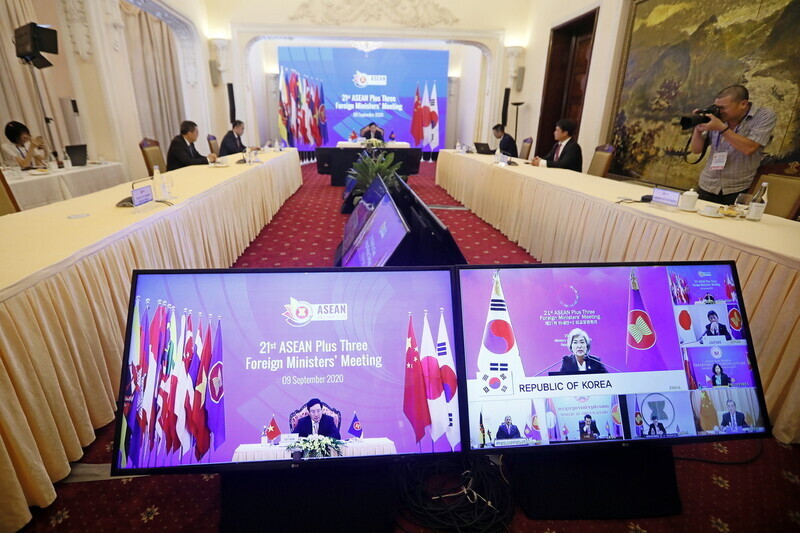hankyoreh
Links to other country sites 다른 나라 사이트 링크
US, China clash over S. China Sea issue in East Asia Summit foreign ministers’ meeting

Amid their mounting conflict, the US and China engaged in another tense battle of nerves on the ASEAN diplomatic stage following their major clash in July and August.
Speaking at an East Asia Summit (EAS) foreign ministers’ meeting via teleconference on Sept. 9, US Secretary of State Mike Pompeo “joined several ASEAN countries and many other partners in raising concerns over the PRC [People’s Republic of China]’s aggressive actions in the South China Sea,” the US State Department reported that day.
Pompeo was also quoted as reiterating that China’s claims regarding the South China Sea are considered “unlawful” according to a 2016 ruling by the Permanent Court of Arbitration in The Hague.
The US and China facing off over the South China Sea issue has become an annual ritual at ASEAN-related foreign minister conferences. The reason it is drawing particular notice this year is that this is the first time the two sides have both attended a meeting following the US’ blunt remarks on the Hong Kong situation, in which it described Chinese President Xi Jinping as a “true believer in a bankrupt, totalitarian ideology,” referring to the Chinese Communist Party.
Pompeo was also critical of Beijing in the presence of its own representative at the meeting, singling out the Hong Kong security law, the arrests of students demanding democratization, the postponement of legislative assembly elections, and the disqualification of pro-democracy candidates.
According to an announcement from the Chinese Foreign Ministry, Chinese State Councilor and Foreign Minister Wang Yi responded at the meeting by declaring that the EAS was “not the setting for interfering in other countries’ internal affairs” and “should not be a stage for attacking other countries’ political systems.” He also accused the US of “pushing ahead with militarization of the South China Sea” to suit its own political needs and “becoming the biggest threat to peace in the South China Sea as it interferences and stirs up conflict.”
China counters by saying US is committed to portraying Beijing as the “chief enemy”At a China-ASEAN foreign ministers’ meeting the day before, Wang was reported by the Chinese Foreign Ministry as saying the US had “fully repudiated its China policies from the past several decades” and was “committing all its energies to exaggeratedly portraying China as its ‘chief enemy.’”
“China-US relations continue to decline due to these constant efforts to pressure China and block its development,” he was also quoted as saying. While the meeting took place remotely, those who observed it described it as “a real war of words with no holding back on either side.”
According to the South Korean Ministry of Foreign Affairs (MOFA), Minister of Foreign Affairs Kang Kyung-wha reiterated her previous stance stressing the “importance of ensuring freedom of passage in the waters and skies [of the South China Sea] and resolving conflicts peacefully through dialogue.” She also reportedly explained again at the meeting about Seoul’s efforts to achieve progress with the Korean Peninsula peace process and called for the support of the international community. The EAS foreign ministers’ meeting was attended by representatives of 18 countries: the 10 ASEAN members, South Korea, China, Japan, the US, Russia, Australia, New Zealand, and India.
By Kim Ji-eun, staff reporter
Please direct comments or questions to [english@hani.co.kr]
Editorial・opinion
![[Column] The state is back — but is it in business? [Column] The state is back — but is it in business?](https://flexible.img.hani.co.kr/flexible/normal/500/300/imgdb/original/2024/0506/8217149564092725.jpg) [Column] The state is back — but is it in business?
[Column] The state is back — but is it in business?![[Column] Life on our Trisolaris [Column] Life on our Trisolaris](https://flexible.img.hani.co.kr/flexible/normal/500/300/imgdb/original/2024/0505/4817148682278544.jpg) [Column] Life on our Trisolaris
[Column] Life on our Trisolaris- [Editorial] Penalties for airing allegations against Korea’s first lady endanger free press
- [Editorial] Yoon must halt procurement of SM-3 interceptor missiles
- [Guest essay] Maybe Korea’s rapid population decline is an opportunity, not a crisis
- [Column] Can Yoon steer diplomacy with Russia, China back on track?
- [Column] Season 2 of special prosecutor probe may be coming to Korea soon
- [Column] Park Geun-hye déjà vu in Yoon Suk-yeol
- [Editorial] New weight of N. Korea’s nuclear threats makes dialogue all the more urgent
- [Guest essay] The real reason Korea’s new right wants to dub Rhee a founding father
Most viewed articles
- 1[Column] Why Korea’s hard right is fated to lose
- 2Amid US-China clash, Korea must remember its failures in the 19th century, advises scholar
- 3[Column] The state is back — but is it in business?
- 4[Column] Life on our Trisolaris
- 5AI is catching up with humans at a ‘shocking’ rate
- 6[Guest essay] Maybe Korea’s rapid population decline is an opportunity, not a crisis
- 760% of young Koreans see no need to have kids after marriage
- 8[Column] Can Yoon steer diplomacy with Russia, China back on track?
- 9[Editorial] Yoon must halt procurement of SM-3 interceptor missiles
- 10[Reporter’s notebook] In Min’s world, she’s the artist — and NewJeans is her art